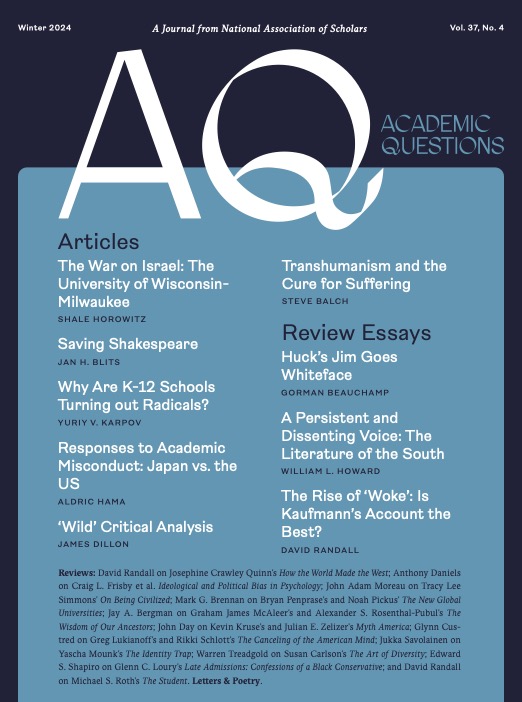The Identity Trap: A Story of Ideas and Power in Our Time, Yascha Mounk, 2023, Penguin Press, pp. 416, $18.00 hardcover.
There is no shortage of books aimed at explaining and repudiating the ideological movement responsible for such cultural innovations as the drag queen story hour, land acknowledgements, gender neutral pronouns, racially segregated graduation ceremonies, and—most recently—Queers for Palestine. Most of these anti-woke books have been authored by conservative writers, such as Christopher Rufo and Douglas Murray, or conservative-friendly moderates, such as Eric Kaufmann and Richard Hanania. Mounk’s The Identity Trap stands out from the crowd as an openly leftist effort to talk sense to his more radical political brethren.
A professor of international affairs at Johns Hopkins University, Mounk supports the enduring goals of the social democratic welfare state, such as universal healthcare coverage and aggressive poverty reduction by public policy. He is rightfully concerned about the ability of the progressive wing of the Democratic party to win the hearts and minds of the American voter should they continue to deny biological sex differences, reject the ideal of objective knowledge, and equate group disparities with systemic discrimination.
The first part of the book describes the intellectual foundations of the Great Awokening. Mounk refers to this phenomenon as “Identity Synthesis” because, in his view, the term captures the essence of the ideology without alienating its followers. According to Mounk, the woke mind virus is a synthesis of four strains of academic folly: Foucauldian postmodernism (rejection of “grand narratives”), postcolonial theory (strategic essentialism), critical race theory (intersectionality), and standpoint epistemology (positionality). Over the course of four chapters, Mounk describes the contexts in which these ideas emerged and their core assumptions. In his appraisal, many of the relevant thinkers, such a Kimberly Crenshaw and Edward Said, made worthwhile points that have lost their nuance at the hands of college administrators, journalists, and other activists.
Part two of the book seeks to explain why these loosely related ideas managed to penetrate the elite institutions of American culture, economy, and public policy. This is probably the most original aspect of the narrative, as it challenges the alternative theory advanced by Christopher Rufo, the preeminent conservative critic of the Great Awokening. In America’s Cultural Revolution, Rufo details the left’s “long march through the institutions” as a slow process originating from the radical student movement of the 1960’s orchestrated by the likes of Herbert Marcuse and his student Angela Davis. In clear contrast, Mounk characterizes the mainstreaming of the woke ideology as a “short march through the institutions” facilitated by social media, with the pioneering platform known as Tumblr as the holy grail.
In Mounk’s analysis, the proliferation of social media platforms like Twitter, Reddit, and Tumblr provided effective forums for spreading radical ideas. They allow anonymous posters to share controversial and emotionally appealing content amplified by engagement-based algorithms. The resulting online communities evolved into alluring echo chambers that reinforce in-group beliefs and punish those who challenge them. New internet-based media sites, such as Vox and Slate, began to capitalize on the business model driven by social media. Eventually, even the legacy media adapted to the new reality of chasing after clicks and shares: “As a result, the main themes of the identity synthesis quickly spread to prestigious outlets, including the New York Times.”
It was in this environment, in the early 2010’s, when the next generation of the nation’s cultural elite went to college and absorbed radical ideas about white supremacy, intersectionality, gender ideology, among other fashionable nonsense. Thanks to their intense immersion in social media, these cohorts entered the workforce prepared to employ illiberal tactics to advance the woke agenda in non-profits, academic institutions, news media, national politics, the entertainment industry, museums, and major corporations. This generational process explains, according to Mounk, why the ACLU has ceased to be a non-partisan defender of free speech, why Anheuser-Busch thought it was a good idea to hire a controversial transgender activist to promote Bud Light, and why President Biden announced that the search for his vice-presidential candidate was limited to the population of black women.
As noted, the driving goal of The Identity Trap is to provide left-leaning readers a healthy alternative to an intellectually compromised and politically divisive ideology. In his day-job as a college professor, Mounk confronts young students who are smart, industrious, and diverse enough to have gained admission to an elite university. It appears that this general demographic is the primary audience of the book. Mounk has witnessed a generation seduced by illiberal activism. He wants to turn the tide towards a more promising brand of progressivism.
This may be the least successful aspect of the book. In his effort to connect with young people with leftist intuitions, Mounk gives way too much credit to assumptions that are entirely divorced from reality.
Throughout the book, Mounk acknowledges “terrible forms of discrimination” suffered by “members of marginalized groups.” For example, he claims that “people with disabilities are sometimes mocked.” If Mounk’s intent is to remind the reader of the accusation that Donald Trump mocked by imitation a disabled journalist at one of his political rallies, it is worth noting that many observers dispute this interpretation of the event. But even if it did occur as Mounk and others claim, Trump suffered politically for it. A 2016 poll of likely voters identified this incident as Mr. Trump’s all-time worst offense against decency. In other words, insensitivity toward or discrimination against the disabled is hardly widespread or “systemic,” In 1996, the Republican Party nominated a disabled veteran, Bob Dole, as their presidential candidate. The current governor of Texas, Gregg Abbott, is confined to a wheelchair. I do not recall any mockery around these elected officials. Even the conservative Americans, it seems, are quite inclusive towards their disabled compatriots.
Without citing any evidence, Mounk claims that “ethnic minorities face open vitriol.” In reality, nothing gets you canceled more swiftly in the contemporary United States than expressing “open vitriol” against members of an ethnic minority. The American mainstream does not tolerate anti-black racism, antisemitism, or any other racist or bigoted speech. With respect to gender ideology, which seeks to erase male and female differences, Mounk gently suggests that “in some contexts, including medicine, institutions need to take an individual’s biological sex into account.” In some contexts? But not in public changing rooms, athletic competitions, or in the prison system? What exactly are the contexts in which we should willfully ignore the reality of biological sex differences?
Mounk is fond of flattering the moral sensibilities of adherents to woke ideology. They are among “the best of people” with “impeccable motives” who feel “righteous anger at genuine injustices.” There are parts of the text where the author resembles one of those effete associate deans trying to persuade a mob of entitled students against heckling the heterodox guest speaker.
His argument against segregating people into race-based “affinity groups” explains to the reader that facilitating positive interaction across groups is a better way to achieve harmony and understanding. This is obviously correct, but I am skeptical that such basic level of common sense manages to persuade anyone at risk of wokeness. Au contraire, Mounk’s strategy of appeasement comes close to cognitive coddling which, according to some analysts, is one of driving forces behind the emergence of the woke mindset.
Professor Mounk has absorbed only one of the two main lessons from The Righteous Mind, Jonathan Haidt’s game-changing treatise on political psychology. Following Haidt’s playbook, Mounk makes a sincere effort to talk to the “elephant” (moral intuitions) as opposed to the mere “rider” (reason). However, in the process, he repeats the cardinal sin of progressive rhetoric by focusing on harm and fairness as the only foundations of morality. This is a mistake if we assume—along with the likes of John McWhorter, Eric Kaufmann, and others—that sanctity—an unwavering commitment to a specific set of sacred beliefs—is a fundamental element of the woke ideology.
Sacred beliefs are resistant to refutation by data and logic. For example, if adherents believe, as a matter of religious dogma, that white supremacy is the nation’s original sin, it seems foolish to expect them to become enthusiastic about universalistic policies of poverty reduction. As Mounk notes, such reforms would, in absolute numbers, benefit working class white people more than black people. It is far more attractive for the identitarian left to push for reparations for slavery and similar initiatives regardless of how divisive and unpopular they are among the American electorate. With friends like that, who needs enemies?
The Identity Trap is an informative and clearly written book about an important phenomenon. I’m glad Yascha Mounk chose to devote his considerable talent to making sense of this influential worldview. His theory of the emergence of “the identity synthesis” is intriguing, although his evidence in support of the “short march” is less than conclusive. To lend credibility to a hypothesis, it is not sufficient to describe facts that are merely consistent with the hypothesis if those facts do not rule out alternative explanations. As the literature on the Great Awokening keeps growing, it would be a fine project for a scholar in political science or sociology to evaluate these competing and partially overlapping explanations using more systematic data and rigorous methods.
Jukka Savolainen is a professor of sociology and criminology at Wayne State University in Detroit, Michigan. He last appeared in AQ with his piece “Country Music Violates the ‘Sacred Project’ of Elites” in the Spring 2024 issue.














